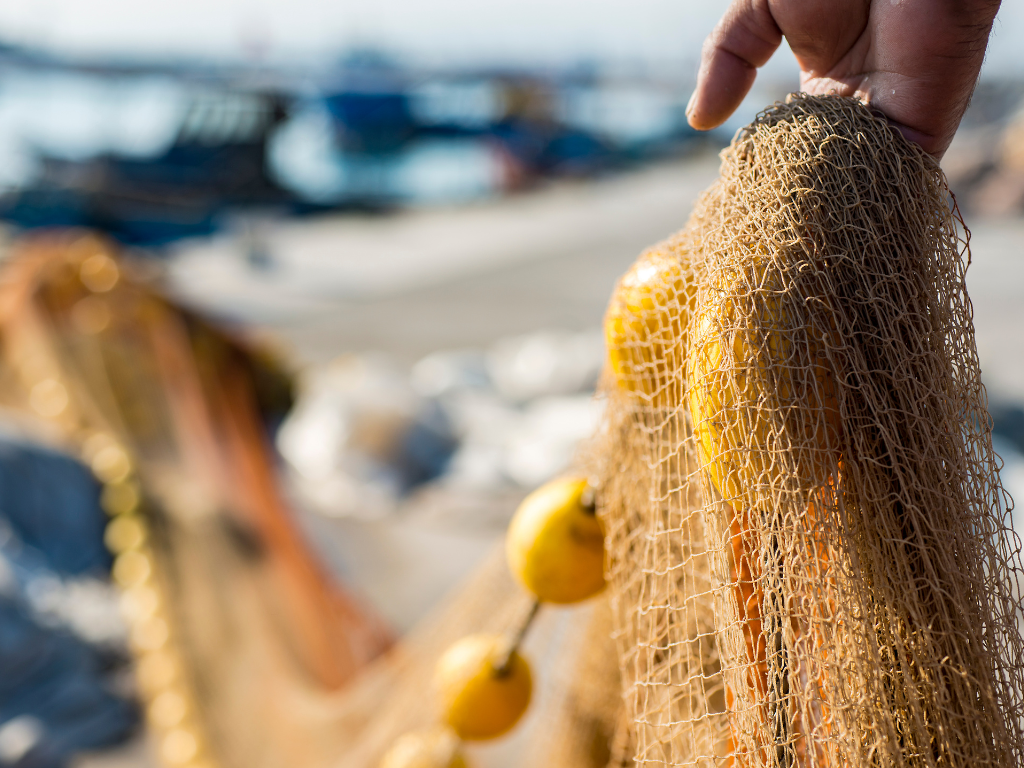Priorities
Sustainable fisheries & aquaculture to feed the world

Sustainable food systems’ relevance has never been more highlighted than in therecent years: the United Nations (UN) Agenda 2030 for Sustainable Development, the UN Food Systems Summit (2021), and the European Union (EU) Green Deal’s Farm to Fork Strategy all call for an in-depth reflection on today’s food systems. Additionally, the exacerbated food insecurity caused by the Covid-19 pandemic and the war in Ukraine created a momentum for strong actions to be taken towards sustainable food systems.
Aquatic food has a considerable role in achieving sustainable food systems. It is an important source of protein and has a lower carbon footprint than other animal production industry. It can contribute to several Sustainable Development Goals (SDGs) and the objectives of the EU Green Deal. The fisheries and aquaculture sectors, therefore, can be a real asset to tackle the climate and biodiversity crisis as well as to provide healthy food to a growing worldwide population. EBCD believes that for the potential of aquatic foods to be fully released, sustainable management of the fisheries and aquaculture sectors needs to improve. While in some regions of the world, efforts toward sustainability generated successful results, some are still lagging behind.
EBCD calls for:
- Acknowledging the importance of aquatic foods to a sustainable food system, food security and achieving the international and EU objectives to tackle climate change and malnutrition;
- Taking further measures to improve the sustainable management of the fisheries and aquaculture sectors in order to fully realise the potential of aquatic foods;
- Raising funds to improve the sustainable management of the fisheries and aquaculture sectors.
The ocean is a complex ecosystem where interactions of organisms and species occur and affects one another. Human activities, including sea-based and land-based activities, further complicate the dynamic of the ecosystem, directly or indirectly affecting the ocean ecosystem.
EBCD believes that an effective ocean management is only possible if the complexity of the ecosystem is taken into consideration as any measure taken will impact the environment and socio-economic activities. That is, instead of a single-species or a single-activity approach, an ecosystem-based approach that considers the different interactions taking place at sea is needed. Such approach also matches the global and European objectives of sustainability, where all three pillars – environment, social and economic aspects – have to be equally considered. In that regard, a complete understanding of the ecosystems is essential in order to have an accurate picture of the interactions at stake. Data collection and strong scientific advice are therefore crucial.
EBCD calls for:
- Equally considering all pillars of sustainability to when implementing management measures based on thorough impact assessments and stakeholders’ consultations;
- Giving the ecosystem-based approach precedence over single-species or single-activity approach.
An ecosystem-based ocean management is needed

Zero tolerance for Illegal, Unreported and Unregulated (IUU) fishing

Illegal, unreported and unregulated (IUU) fishing is one of the major threats to the ocean and the communities that depend on it. IUU fishing depletes the stock, damages marine ecosystems, and deprives local communities of income and growth opportunities. It also leads to unfair competition for law-abiding fishers, and is commonly related to criminal activities, money laundering, tax evasion, and human rights abuses.
Enormous efforts have been done to tackle IUU fishing at both the global and European level. Several instruments have been created globally to ensure effective cooperation and harmonized actions against IUU fishing. The FAO Port State Measures Agreement (PSMA), the UN Fish Stock Agreement, and the recently concluded WTO Agreement on fisheries subsidies are among the important steps but more needs to be done to ensure the effective implementation worldwide. Some countries still have not ratify these important agreements while others failed to implement them.
At the European level, the IUU Regulation and its carding system is an important tool to ensure that no IUU-derived products enter the EU. As a large market with 500 million consumers, the EU has a responsibility to call for global cooperation on combating IUU fishing, which is also one of the requirements specified in the Sustainable Development chapters of the EU’s new generation of free trade agreements. If well implemented, these free trade agreements will be a powerful tool to eradicate IUU fishing worldwide. Moreover, a zero-tolerance policy on IUU fishing is also recalled and emphasized in the EU’s 2030 Biodiversity and Farm to Fork Strategies.
EBCD calls for:
- Ensuring ratification as well as a complete and effective implementation of international agreements to tackle IUU fishing ;
- Improving transparency and traceability in the entire value chain;
- The EU to fully utilise its market-state advantage to ensure that no IUU fishing product enters the EU market.
The impact of climate change on the ocean and the seas, including rise of temperature, acidification, sea level rise and migration of species, are becoming more and more visible. Climate change is now considered as a top priority on international, regional and national agendas. Taking immediate measures to mitigate climate change as well as to adapt to its unavoidable consequences has become necessary. Achieving SDG 13 “Climate action” of the UN Agenda 2030 for Sustainable Development requires countries to take urgent action to combat climate change and its impacts.
Alarmingly, the International Panel on Climate Change (IPCC), which is currently in its sixth assessment cycle, has presented a worrying state of play of the situation and the consequences of climate change on marine ecosystems and fisheries. In its report entitled “The Ocean and Cryosphere in a Changing Climate (2022)”, the panel recommended taking actions to adapt to climate change and to considerably reduce greenhouse gas emissions. Where it was already back in 2016 when 196 Parties to the UN Framework Convention on Climate Change (COP 21) agreed to tackle global warming by reducing considerably greenhouse gas emissions (the Paris Agreement), full implementation of the Paris Agreement is still lacking. The Declaration of the 2nd UN Ocean Conference (2022) therefore emphasized the need to ensure the implementation of the Paris Agreement.
EBCD has been insisting on the importance of recognizing climate change as one of the main threats for the oceans and fisheries on international and European fora.
EBCD calls for:
- Taking immediate measures to tackle climate change and adapt to its unavoidable consequences;
- Fully implementing the Paris Agreement;
- Facilitating the decarbonization of the fisheries, aquaculture and maritime sectors.
Tackle climate change and adapt to its unavoidable effects

Understand and manage the oceans with science and innovation

The most up-to-date scientific knowledge is essential to understand the marine ecosystem and to take appropriate measures to efficiently manage it. It is indispensable for the ecosystem-based ocean management.
Undoubtedly, more needs to be done to improve scientific knowledge of the ocean at the current stage. There is an urgent need to improve data collection, forecasting as well as marine ecosystem mapping. In a world where digitalization and innovation offer possibilities to achieve these objectives, EBCD believes that all tools available have to be utilized to improve mankind’s knowledge of the ocean. The Digital Twin Ocean seems to be a way forward to improve ocean knowledge. At the same time, empirical knowledge must be also sought to properly understand what is at stake when implementing management measures, and all three pillars of sustainability (environment, economic and social) need to be equally considered. In that context, fishers, navigating the oceans and daily witnessing what is happening at sea, have to be heard and consulted.
EBCD calls for:
- Improving data collection, forecasting and marine ecosystem mapping;
- Increasing political awareness on a Digital Twin for the Ocean;
- Taking all management measures based on the best-available and most up-to-date scientific knowledge and including empirical knowledge;
- Raising funds on ocean knowledge.
The ocean is crucial for supporting life on the Earth and providing important components for human survival, such as climate stabilisation, food, and energy security. Despite its significance, the ocean is threatened by various factors, including climate change-induced phenomena like acidification, sea level rise, and species migration, as well as unsustainable resource exploitation and plastic and chemical pollution. To address these challenges, EBCD emphasises the importance of raising political awareness of the ocean’s significant role.
The ocean is a complex ecosystem that hosts a significant number of species and activities, such as fisheries, maritime transport, and offshore energy production, interacting with each other. This makes the ocean the intersection of various policies, including environment, fisheries, and transport, which sometimes lack the necessary coherence to ensure a sustainable use of ocean resources. As a result, important decisions are sometimes inconsistent and incoherent because policies are organized in separate categories, despite the interrelated nature of all biodiversity and climate-related issues. The multiplicity of instruments and policies and the lack of connectivity between them, therefore, weaken the overall governance framework.
To ensure the sustainable management of the ocean, EBCD emphasizes the need to establish and strengthen a more holistic regulatory framework at the regional, European, and international level.
EBCD calls for:
- Increasing political awareness on the role the ocean play for life on the Earth and on the numerous ecosystem components it offers;
- Establishing a more coherent and comprehensive international and EU regulatory framework that breaks the silos amongst oceans-related policies;
- Promoting inter-agency and inter-sectorial approach.
Adopt a more coherent approach to ocean governance

Foster the interface between fisheries management and ocean conservation

Fisheries management and ocean conservation have often moved toward opposite directions with diverging narratives, priorities and objectives. These conflicts have resulted in uncoherent policies, strategies and approaches that, if properly integrated, could lead to more effective results for the sustainability of fisheries and the protection of related marine ecosystems. With the aim to improve both sustainable use and conservation policies, synergies need to be sought through better integration and convergence of these two governance streams. Fostering common outcomes and avoiding redundancies can be a powerful tool to increase efficiencies and identify opportunities for win-win solutions that recognize the human element within natural ecosystems while ensuring the long-term sustainability of marine biodiversity.
Within this framework, EBCD finds it of paramount importance to understand the ocean in a holistic and comprehensive manner, considering its multiple values and uses for communities and ecosystems in different regions. Issues such as food security, cultural diversity, healthy ecosystems and climate resilience are important elements to foster in all marine policies.
EBCD calls for:
- Strengthening the connection between fisheries management and ocean conservation;
- Enhancing dialogue between sustainable use and conservation communities;
- Providing fisheries expert inputs in ocean conservation policies, strategies, and practices.
So…how is EBCD acting to push forward these priorities?
At global level
- Contributing to an important number of international conferences and negotiations including through the Secretariat of the IUCN Fisheries Expert Group; and
- Organising events in relevant international fora that aim at creating dialogue between stakeholders on the sustainable use of the oceans.
At European level
- Acting as a member of five Advisory Councils (North Western Waters, North Sea, Pelagic, Outermost Regions and Long-Distance) of the EU Common Fisheries where stakeholders are gathered to provide advice to the European Commission;
- Providing the Secretariat of the Market Advisory Council and the Secretariat of the European Parliament Intergroup on Climate Change, Biodiversity and Sustainable Development;
- Contributing to several European Commission’s public or stakeholder consultations.